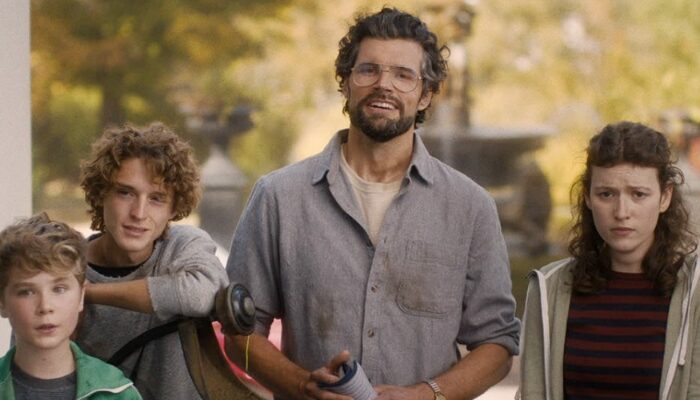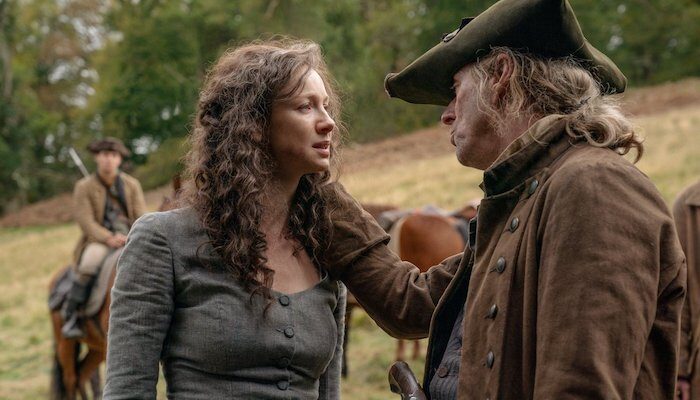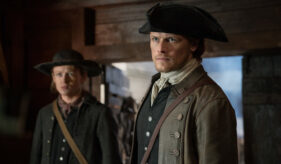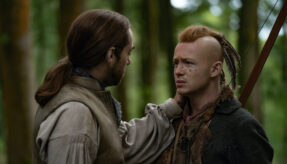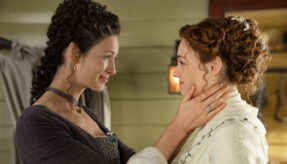TV Review: OUTLANDER: Season 5, Episode 12: Never My Love [Starz]
Table of Contents
Outlander Never My Love Review
Starz‘s Outlander: Season 5, Episode 12: Never My Love TV Show Review. Outlander: Season 5, Episode 12: Never My Love is a tragic episode featuring an inventive coping tool that surrounds and intermingles with its user’s mind in an attempt to stop-loss hope, happiness, sanity, and resilience.
The Too-quick Boy
How Lionel Brown (Ned Dennehy) devalues Dr. Claire Fraser (Caitriona Balfe), or women in general, to the point of being able to rape her without a second thought is an unanswered mystery, but how others can that don’t possess his particular personality traits is even more vexing. Take the boy Lionel brings to Claire. Lionel brings Cuddy Brown (Michael Monroe) to rape Claire for his ‘first time.’ This is how warped Lionel’s mind is but the boy too, though most-likely pressured, has no problem either with it (he knows no better). Cuddy has been taught no moral code or he has but its a code that allows for this sort of thing. Cuddy ‘finishing’ without penetration lulls the viewer into thinking that this is going to be just like all the other times Claire was threatened with rape in Outlander i.e. a last minute reprieve would arrive and calamity would be averted. That does not happen in Never My Love.
Going Somewhere Else
The multiple attacks that Claire Fraser endures in Never My Love are completely unexpected, even more so because their prospect is toyed with in the lead-up to them. The viewer knows that Lionel Brown is upset at Claire and has wanted to put her “in her place” for some time but never knew he would take it this far.
When the fantasy visions begin in Never My Love, the viewer immediately sees them as a coping mechanism to deal with being kidnapped and put in danger, the stress causing Claire’s mind to reach out and bend reality into something palatable, good, and idealistic.
One wonders, though, during all of the times she was with Black Jack Randall and something bad was happening or about to happen, why her mind never coped with the adverse situation in the same way. Perhaps the visions are a foreshadowing mechanism in this episode that something bad is going to happen. It also serves as the preemptive answering to the viewer’s question of how, internally, Claire handles the trauma.
If that is the case, the fantasy visions are not quite as effective as they can be, even in hindsight after the episode has concluded. While the fantasy visions are happening, the viewer doesn’t know why they are happening since Claire has never before coped in this way. It is only after the assaults that the viewer realizes ‘the why’ for the visions.
As in Eric Bress and Mackye Gruber‘s The Butterfly Effect, when a fellow prisoner prompts the protagonist to go somewhere else in his head if he is raped, that is exactly what Claire does in Never My Love, with the viewer literally seeing it happen.
Even with ‘the why’ quandary answered, a question remains – why did Claire never go to this safe-space when previously in a precarious situation?
For whatever reason it happens this time around, it does. The fantasy visions give the viewer a visual breather when horrors begin to transpire but I am not sure the viewer needs one. After five seasons, the viewer is acclimated to the real-world horrors present in Outlander. They happen to the good and to the bad in equal measure on this show. A sugary-coating does not make them any more salubrious.
Not Just One
Lionel Brown believes that Dr. Claire Fraser has gotten the better of him more than once, outsmarted him (i.e. the Dr. Rawlings’ pseudonym), and superimposed her will on him. A volcano of indignation has built up inside him towards Dr. Fraser until it bursts, and he tries to humiliate her and take her down a peg or two as he believes she has knowingly done to him. Lionel feels justified when he ‘withdraws’ from her and says: “Not so high and mighty now.”
Through rape, Lionel feels that he has finally gotten the better of Claire, that he’s gotten some of his pride back, that some of his manhood has been restored. Lionel doesn’t realize that by committing this act, he proves how little manhood had in the first place and destroys what residue of it is left. Black Jack Randall was self-aware. He knew that he was a monster. Lionel doesn’t. Lionel thinks he is a normal man giving someone their justly-deserved comeuppance. Lionel’s dream-world is just as elaborate as the one Claire constructs for herself in Never My Love.
When Lionel invites others to ‘partake’ after his ‘withdrawal’, the attack on Claire turns from an act of twisted revenge into that of cruelty, degradation, and punishment. That is not to say that the first rape was not these things because it was but when Lionel entreats others, he isn’t taking by force pleasures of the flesh like William Bonnet. Lionel, instead, is creating then sipping a singular brew of misery. It’s that misery that is Lionel’s pleasure. He doesn’t need to get something out of it. Claire’s physical and mental pain is the goal. Lionel is a hangman sentencing Claire to a noose of a different sort, a malevolent sort, and every time Claire is raped by one of his compatriots, that noose snaps her neck again, and again, and again.
Talks Himself into Death
Lionel Brown is not only a rapist but a loud-mouth fool. He has a shield of protection around him, because of what his kin will do if he is killed, and talks himself into being murdered by an enraged and indignant Marsali MacKimmie Fraser (Lauren Lyle). All he has to do is keep his mouth shut and be attended to by those that loathe him. He can’t do it. He is so juiced up on his supposed victory over Claire the night before, surviving his comeuppance that night, and the powerlessness of Claire’s would-be avengers surrounding him. He feeds on his victory, on his position in their community, on his restored manhood. He is dominant again. A rooster again. Virile again. A man again, king of all he surveys. An untouchable God full of elation. And then a mere mortal woman, a peasant girl, takes it all away from him, in one stroke.
Survivor-to-survivor
The juxtaposition between mother and daughter in Never My Love is jarring. In those moments, each one intimately knows what the other has been through during their reunion, what is going through the other’s head. Brianna “Bree” Randall Fraser (Sophie Skelton) knows what Claire Fraser needs and doesn’t need and is there for her. It’s terrible, beautiful, and touching. Unlike Brianna, who had to exist in that repugnant moment in her life, for the most part, by herself, Claire has Brianna.
The Traveler Team
The team of Travelers from the future, seeing the actual past instead of reading about it in fragments, is a thrilling new development in Outlander. The fact that Wendigo Donner (Brennan Martin) doesn’t intervene on Claire’s behalf and runs away before or after the rapes begin is cowardly but at the same time completely understandable (from his perspective). Donner is an intruder in an alien world, in an alien time, surrounded by rascals, louts, and criminals. If he overtly tries to intervene, he might be killed or raped by Lionel Brown’s men in Claire’s place. Instead of facing either of these outcomes, he runs away (like the highschool rape witness in Niki Caro‘s North Country), possibly to the safety and sanity of the future or to a more civilized venue in the past. Wherever he runs, he absconds deftly, not wanting to share in Claire’s fate or meet death on what is supposed to be a voyage of exploration and information-gathering.
The Past is Home
Brianna Randall Fraser and Roger Wakefield MacKenzie (Richard Rankin) resigning themselves to stay in the past is dubious. They both want to go to the future but initially think “home” when touching the travel stone. That doesn’t work. Okay. Got it. So why not try again (while you are at the travel stone) but this time think “I want to go 200 years into the future”? This question is never answered, or even approached, in Never My Love and the lingering question is, why?
Leave your thoughts on this Outlander Never My Love review and this episode of Outlander below in the comments section. Readers seeking to support this type of content can visit our Patreon Page and become one of FilmBook’s patrons. Readers seeking more Outlander articles can visit our Outlander Page. Readers seeking more Starz articles can visit our Starz Page, our Starz Twitter Page, and our Starz Facebook Page. Readers seeking more TV show reviews can visit our TV Show Review Page, our TV Show Review Twitter Page, and our TV Show Review Facebook Page. Want up-to-the-minute notification? FilmBook staff members publish articles by Email, Twitter, Facebook, Instagram, Tumblr, Pinterest, Reddit, and Flipboard.
Related Articles
FilmBook's Newsletter
Subscribe to FilmBook’s Daily Newsletter for the latest news!

